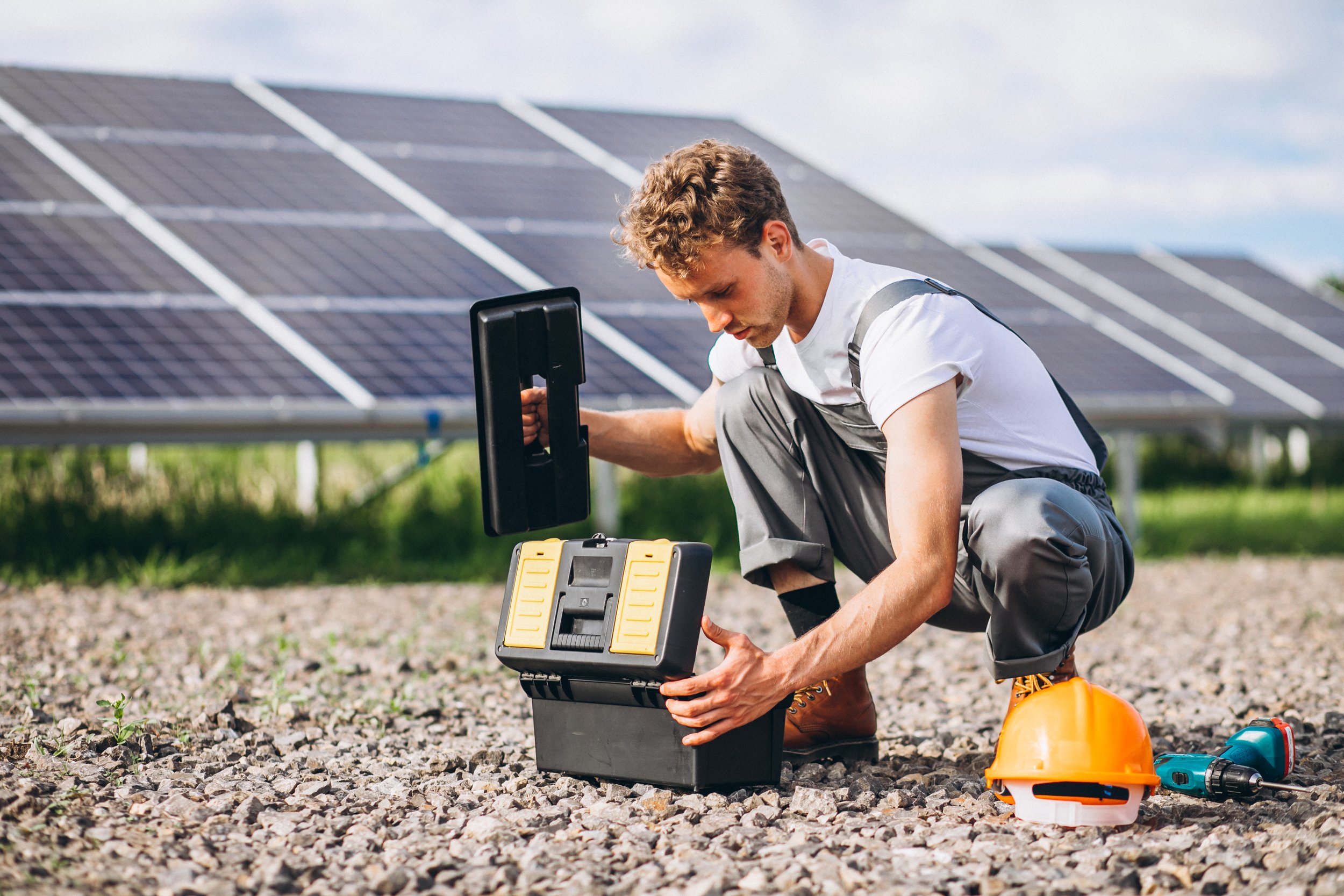What Is a Solar Tracker and Solar Tracking System Worth It?
With growing concerns for the environment and a chase towards a cleaner and renewable source of energy, solar energy has seen various innovations that can lead towards a sustainable future. Amongst various new features, sun tracker for solar panels are one that look intriguing on various grounds. To help you better understand solar panel tracking systems, let’s look at what exactly these are and is it worth your investment? We will also explore various available options in the market, the pros and cons associated with sun tracking solar panels, and the overall impact they have in terms of energy output and efficiency.
The Magic of Solar Trackers Explained Simply
What's a Solar Tracker?
Imagine your solar panels are like sunflowers. They want to face the sun to get energy. Now, think of a solar tracker as their helpful friend. It's a system that makes sure your panels always face the sun, so they get the most sunlight possible. In other words, it converts your fixed panels into solar panels that follow the sun. This movement helps the panels get the most sunlight possible so that your panels can work better and give you more energy for your home.
Exploring Solar Tracker Varieties:
When it comes to solar tracking systems, there are various options that exist in the market, each designed to optimize sunlight exposure in different ways. The main types of solar trackers include:
1. Single Axis Solar Trackers:
Within single axis solar tracking systems, there are two options available:
● Horizontal Axis: These kinds of Single-Axis trackers move on a single horizontal axis, adjusting the tilt of the solar panels as the sun moves from east to west. They are quite popular amongst individuals because of their simplicity and cost-effectiveness and are often preferred over dual-axis solar panel trackers.
● Vertical Axis: These Single-Axis trackers rotate on a single vertical axis, changing the orientation of the panels to follow the sun's daily path. While they are less common and barely seen in normal settings, they are suitable for specific applications where there might be space or location constraints for horizontal setup.
2. Dual Axis Solar Trackers:
These trackers move on both horizontal and vertical axes, allowing for more precise alignment with the sun throughout the day. Dual axis solar tracking systems maximize energy capture, making them ideal for locations with high solar variability.
3. Photovoltaic (PV) Trackers:
To maximize the electricity generated by solar panels, PV trackers follow the sun. They are commonly used in large-scale solar power plants.
4. Concentrated Solar Power or CSP Trackers:
CSP trackers are designed for solar systems that use mirrors or lenses to concentrate sunlight onto a small area. These trackers ensure optimal alignment to focus sunlight effectively.
5. Passive Solar Trackers:
Unlike active trackers that use motors and sensors, passive solar trackers rely on changes in temperature or sunlight to adjust the position of solar panels. They are simpler and have fewer components, often used in smaller-scale applications.
6. Active Solar Trackers:
Active solar trackers use motors, sensors, and controllers to actively adjust the position of solar panels based on the sun's position. They are more complex but offer precise tracking, optimizing energy capture.
7. Clockwise and Counterclockwise Trackers:
Some solar trackers move in a clockwise direction, while others move counterclockwise. The choice depends on the geographical location and the desired tracking path.
8. Azimuth Solar Trackers:
Azimuth trackers rotate on a horizontal axis and adjust the solar panels' orientation in the north-south direction. They are commonly used in large solar installations.
With numerous options to choose from, the selection of a particular type of solar tracker depends on a variety of deciding factors such as the location of the setup, available space for installation, budget allowed, and the specific requirements of the solar power system. Each type has its advantages and limitations, and the choice should align with the goals of the solar project.
on the potential benefits and considerations.
Pros and Cons: Navigating the Solar Tracker Terrain
Now that we've explored the various types of solar trackers, it's essential to evaluate the pros and cons before deciding whether this technology aligns with your solar aspirations. Let's look into the details, exploring the advantages such as overall efficiency, financial gains, and other benefits that may tip the scales in favor of solar trackers and the potential drawbacks that warrant careful consideration.
Pros of Solar Trackers:
1. Enhanced Energy Yield:
The primary benefit of solar trackers lies in their ability to maximize energy production. By dynamically adjusting the orientation of solar panels throughout the day, these trackers ensure panels are continually facing the sun, optimizing sunlight absorption. This increased exposure can lead to a significant boost in energy yield, particularly in regions with ample sunlight, leading to a better overall yield.
2. Improved Efficiency:
Solar trackers minimize one of the common challenges when it comes to solar panels, the shading effects, ensuring that sunlight directly reaches the solar panels most of the time. This adaptability to changing sunlight angles enhances overall system efficiency, making it an attractive proposition for those who prioritize optimal performance.
3. Ideal for Large-Scale Installations:
For expansive solar installations, such as solar farms or commercial setups, the efficiency gains of solar trackers become even more pronounced. Large-scale systems with hundreds of solar panels can leverage the potential for increased energy production, justifying the additional investment.
4. Maximizing Return on Investment (ROI):
In regions with favorable sunlight conditions, where solar panels can operate at their peak potential, the additional investment in solar trackers may result in a quicker return on investment. This can make them a financially sound choice over the long term.
Cons of Solar Trackers:
Depending upon your situations and requirements, the below points underscores that while solar trackers can indeed augment efficiency, the financial gains may not always offset the initial investment.
1. Upfront Cost:
The most significant hurdle for many potential adopters is the initial cost that is required to setup the solar trackers. While the technology has become more affordable over time, the initial investment remains a crucial factor that may deter some from considering solar trackers.
2. Maintenance Complexity:
As per the experts of solar panels installation in New Jersey, solar trackers introduce more moving parts to the solar setup, increasing the potential points of maintenance. While modern trackers are designed to be robust and durable, the complexity may require more vigilant upkeep compared to fixed-tilt systems.
3. Geographical Limitations:
The efficacy of solar trackers is closely tied to the geographical location. In regions with inconsistent sunlight or frequent cloud cover, the benefits of solar trackers might be diminished. Understanding the solar potential of your specific location is paramount before opting for this technology.
4. Space Requirements:
Solar trackers, especially the dual-axis variants, require more space to operate efficiently. This spatial requirement may pose challenges for installations with limited available land. It's crucial to evaluate whether the space constraints of your site align with the demands of solar tracker technology.
In Conclusion
In the ongoing trend of renewable energy, the effectiveness of a solar tracker ultimately depends on your unique circumstances. If you find yourself in a sun-drenched locale like New Jersey and aspire for optimal efficiency, a solar tracker could be a transformative addition. On the other hand, if you reside in an area with less consistent sunlight, the augmented cost might not yield the same return on investment.
Solar tracker systems can be likened to the cherry on top – a delightful enhancement if it aligns seamlessly with your objectives and financial plan. Before reaching a decision, seeking counsel from Solar Company in New York or New Jersey can offer more personalized insights tailored to your specific situation. Whether you opt for the path of a sun tracker or not, remember, each solar panel under the sun propels us toward a cleaner, greener tomorrow.


